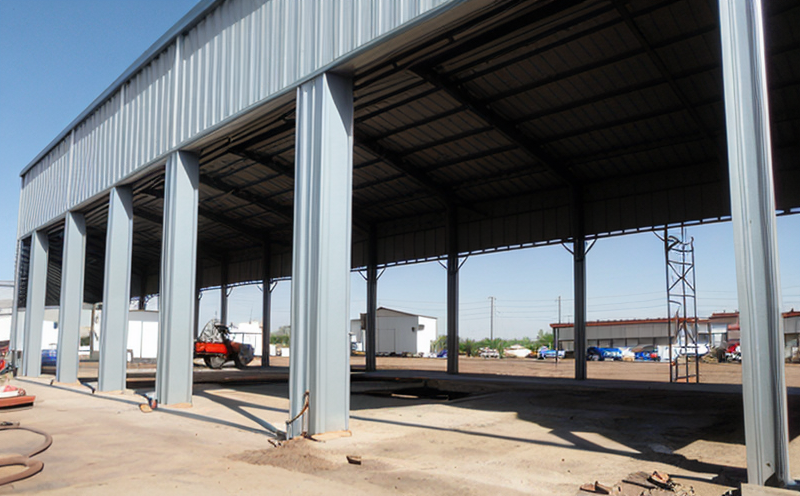ASTM E709 Magnetic Particle Inspection
The ASTM E709 standard outlines a method of non-destructive testing (NDT) known as magnetic particle inspection (MPI). This technique is primarily used to detect surface and near-surface discontinuities in ferromagnetic materials such as steel, cast iron, and some nickel-based alloys. The process involves applying an external magnetic field to the material being tested, followed by the application of a visible or fluorescent magnetic particles. These particles align with any flaws in the metal and form distinct patterns that indicate the presence and location of defects.
The ASTM E709 MPI test is particularly valuable for industries where structural integrity is paramount, such as construction, manufacturing, and aerospace. In these sectors, even minor imperfections can compromise safety and performance. The method’s ability to identify flaws early in the production process ensures that defective materials are not used, thus maintaining high-quality standards.
The ASTM E709 MPI procedure is versatile, capable of detecting various types of defects including cracks, voids, porosity, and inclusions. It can also reveal delaminations and other surface discontinuities that could indicate potential failure points within the structure. The test's sensitivity to small defects makes it an indispensable tool for ensuring structural integrity.
During a typical ASTM E709 MPI process, the specimen is prepared by cleaning the area to be tested thoroughly. This ensures that no contaminants interfere with the magnetic field and subsequent particle alignment. Once cleaned, the part is magnetized using either direct current (DC) or alternating current (AC). The choice of current type depends on the specific requirements of the inspection.
The next step involves applying a suspension of ferrous particles in a liquid medium to the magnetized surface. These particles are attracted to areas where there are discontinuities, forming visible patterns that can be interpreted by trained inspectors. For fluorescent testing, the area is typically exposed to ultraviolet light for enhanced visibility.
The results of an ASTM E709 MPI test provide critical information about the structural condition of materials used in various applications. This data aids quality managers and engineers in making informed decisions regarding material acceptance or rejection. By using this method, industries can ensure that only high-quality materials are used in their products, thereby enhancing reliability and safety.
The ASTM E709 MPI process is widely recognized for its effectiveness and reliability in detecting flaws in ferromagnetic materials. Its ability to identify even minute defects ensures that structures remain safe and perform as expected throughout their service life. This makes it an essential part of any quality assurance program aimed at maintaining high standards in manufacturing processes.
Industry Applications
The ASTM E709 MPI technique finds extensive application across numerous sectors, particularly those involving critical structures and components where even minor defects could lead to catastrophic failure. Here are some key industries that benefit from this testing method:
- Construction Industry: Ensuring the structural integrity of buildings, bridges, and other large-scale infrastructure projects.
- Aerospace Industry: Detecting flaws in aircraft components like landing gears, engine parts, and fuselage structures.
- Mechanical Engineering: Quality assurance for manufacturing processes involving complex metal parts used in machinery.
- Shipbuilding: Verifying the structural soundness of ship hulls and other critical components.
In each of these sectors, ASTM E709 MPI plays a crucial role by providing detailed insights into material conditions, which are vital for maintaining safety standards. The method’s versatility allows it to be adapted to meet specific requirements in different environments and applications.
Eurolab Advantages
At Eurolab, we pride ourselves on offering comprehensive ASTM E709 Magnetic Particle Inspection services tailored to the unique needs of our clients. Our expertise in this field is complemented by state-of-the-art equipment and highly trained professionals who ensure accurate and reliable results.
- Accurate Results: Our team uses advanced technology and adheres strictly to ASTM E709 standards, ensuring precise defect detection.
- Expertise: Eurolab’s professionals are certified in MPI testing and maintain continuous education to stay at the forefront of industry practices.
- Comprehensive Reporting: Detailed reports are provided for every inspection, highlighting findings and recommendations for corrective actions if necessary.
- Custom Solutions: We offer tailored solutions that meet specific project requirements, ensuring maximum efficiency and effectiveness.
By leveraging our extensive experience and resources, Eurolab ensures that every ASTM E709 MPI test is conducted with the highest level of professionalism and accuracy. Our commitment to quality and reliability has earned us a reputation as a leading provider in this field.
Customer Impact and Satisfaction
The use of ASTM E709 Magnetic Particle Inspection by Eurolab significantly impacts our customers, enhancing their operations through reliable testing and quality assurance. Our services contribute to safer environments and more robust structures in critical industries.
- Enhanced Safety: By identifying potential flaws early, we help prevent accidents and failures that could result from undetected defects.
- Cost Savings: Early detection of issues allows for timely repairs or replacements, avoiding costly downtime and maintenance expenses.
- Reputation Building: Consistent use of high-quality materials and testing ensures a positive reputation among clients and stakeholders.
- Compliance Assurance: Our adherence to international standards guarantees compliance with regulatory requirements, reducing the risk of non-conformance penalties.
Customer satisfaction is at the heart of our operations. We strive to provide services that meet or exceed client expectations, fostering long-term partnerships and trust.





